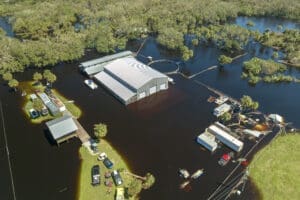Does Your Business Insurance Cover Floods?

Floods can strike unexpectedly, causing significant damage to your Florida Panhandle businesses. As a business owner, you might wonder, “Does my business insurance policy cover floods?” At Term Brokers Insurance, we’re here to clarify flood coverage for commercial properties and help you protect your business from costly losses.
Understanding Business Insurance and Flood Coverage
Most standard business insurance policies, such as Business Owners Policies (BOPs), do not include flood coverage. These policies typically cover risks like fire, theft, or liability but exclude flood-related damage caused by:
- Heavy rain or storm surges
- Overflowing rivers or streams
- Coastal flooding or hurricanes
Without specific commercial flood insurance, your business could face significant out-of-pocket expenses for repairs, inventory replacement, or downtime. According to the National Flood Insurance Program (NFIP), just one inch of floodwater can cause up to $25,000 in damage to a commercial property.
Do You Need Commercial Flood Insurance?
If your business is located in a flood-prone area, such as coastal regions or near rivers, commercial flood insurance is critical. Even businesses outside high-risk zones can benefit, as 25% of flood claims occur in low-to-moderate risk areas, per FEMA data. Consider flood insurance if:
- Your business operates in a flood zone (check FEMA’s Flood Map Service Center).
- You own valuable equipment, inventory, or property vulnerable to water damage.
- Downtime from flooding could disrupt your operations or revenue.
Types of Flood Insurance for Businesses
At Term Brokers Insurance, we offer tailored flood insurance solutions to meet your needs:
- NFIP Commercial Flood Insurance: Backed by FEMA, this covers up to $500,000 for building damage and $500,000 for contents. Ideal for small to mid-sized businesses.
- Private Flood Insurance: Offers higher coverage limits and customizable options for larger businesses or unique risks.
- Excess Flood Insurance: Supplements NFIP policies for businesses needing additional protection.
Our team can assess your business’s flood risk and recommend the best policy to safeguard your assets.
How to Get Flood Insurance for Your Business
Securing business flood insurance is straightforward with Term Brokers:
- Contact Us: Call 850-864-2000 or request a free commercial flood insurance quote.
- Risk Assessment: We’ll evaluate your property’s flood zone and coverage needs.
- Customized Policy: Receive a tailored flood insurance plan that fits your budget.
- Ongoing Support: We’re here to answer questions and assist with claims.
Don’t wait for a flood to discover your policy’s limitations. Protect your business today with comprehensive flood coverage.
Why Choose Term Brokers Insurance?
With over 21 of experience, Term Brokers Insurance specializes in helping Florida Panhandle businesses find affordable, reliable insurance solutions. Our experts understand the unique risks of flooding in areas like [e.g., Walton County, FL], and we partner with top-rated carriers to deliver peace of mind.
Frequently Asked Questions
Q: Is flood insurance required for my business?
A: Flood insurance is typically optional unless your property is in a high-risk flood zone and you have a federally backed mortgage. However, it’s highly recommended for all businesses.
Q: How much does commercial flood insurance cost?
A: Costs vary based on location, property value, and coverage limits. NFIP policies start at around $500–$1,000 annually, while private options may differ. Contact us for a personalized quote.
Q: How soon does flood insurance take effect?
A: Most policies have a 30-day waiting period, so don’t delay in securing coverage.
Take Action Today
Floods can devastate businesses, but the right insurance can make all the difference. Let Term Brokers Insurance help you find the best commercial flood insurance for your needs.
Get a Free Quote: Call 850-864-2000 or complete our online commercial flood insurance quote form.
Learn More:
Explore our blog post on business continuity insurance to protect you should your business operations be shutdown for an extended period.
